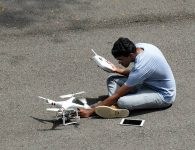

An Israeli agtech company called Seedo might have the solution for the challenges of urban agriculture in vulnerable areas such as the Caribbean, that struggle with environmental and climate factors that lead to crop loss.
A Seedo container is the size of a small fridge
Seedo
Latin and America and the Caribbean is the most urbanised region in the world with up to 80% of the region’s population residing in cities (UN-Habitat 2012). While urbanization is an important element of economic growth and modernization, the diminishing ratio of food producers to food consumers in urban settings negatively impacts local food systems, causing populations to be more susceptible to non-communicable diseases, obesity and undernourishment.
Urban farming practices such as rooftop gardens, community greenhouses and vertical farms have provided an alternative to rural agriculture, but given the high cost of urban land, space and size limitations, non-conducive environmental conditions and limited human resources, these methods have not been without their challenges.
Vertical farming’s “closed and controlled” approach has been successful in eliminating the risk of insects, pests and diseases that are prevalent in traditional agricultural systems but the infrastructure required has typically been cost-prohibitive and highly reliant on fossil fuels (solar power is typically not enough).
Seedo is the world’s first fully-automated and controlled indoor-growing technology for the “at-home” market— the self-driving car of agriculture. Compact commercial containers that resemble small refrigerators utilize AI algorithms to produce optimal water and light conditions— essentially controlling the weather— through a hybrid system of hydroponics and aeroponics.
Seedo can grow fruits, vegetables, flowers and herbs— up to five species at a time per system, and has become extremely popular within the cannabis industry.
“The advantage of Seedo technology is that you can grow a wide range of crops in any climate and any season with no knowledge of how to grow and still achieve high-quality crops,” says Seedo’s CEO, Zohar Levy. “Seedo’s AI algorithm makes life easy for growers and of course, it is pesticide-free. You can enjoy fresh and tasty food year-round.”
The team at Seedo has recognized the relevance of their technology for environmentally vulnerable communities. In May 2019, the company qualified as a registered vendor for the United Nations Global Marketplace and intends to establish pilot programs in countries suffering from extreme climates. In a nod to its applicability to sustainable and climate-smart development, Dr. Jendayi Frazer, the former U.S. Assistant Secretary of State for African Affairs and one of the United States’ leading voices in international policy, has joined Seedo’s Board of Directors.
“Making AI technology such as Seedo accessible and affordable at the grassroots level will enable food systems to be localised without soil exploitation, deforestation or exposure to climate risk,” says Levy.
At the time of publication, a Seedo system retailed for a mere $2,400— a small fraction of the cost of typical vertical farming systems. The price includes the Seedo box, filters (water, air), starting nutrients and access to the Seedo app, which allows users to receive notifications about growth, health and harvest time. But the real savings are in the diminished risk of crop loss and the elimination of labour requirements. According to Levy, Seedo can do away with the estimated 40% of annual farm costs that are funnelled into wages, salaries and contract labour expenses.
Levy, in a recent report to shareholders, indicated that the combined capabilities of artificial intelligence, big data, robotics, and remote grow technologies makes Seedo and optimal solution for farmers “in a variety of “at-risk” markets. Stackable containers afford dramatic savings in land-use, water consumption and human labor needs… independent of climate conditions.”
According to the International Data Corporation, global spending on artificial intelligence will grow to around $58 billion by 2021. The agriculture sector has been particularly responsive to these technologies, particularly in environmentally vulnerable contexts. In the context of the Dominican Republic, artificial intelligence has enabled the growth of the agricultural sector to 14% of GDP.
Seedo could be a huge advance for small island economies that disproportionately struggle with climate change impacts, food insecurity, knowledge gaps and limited capital or farming technology.
read more at http://www.forbes.com/entrepreneurs/ by Daphne Ewing-Chow, Contributor
Business








